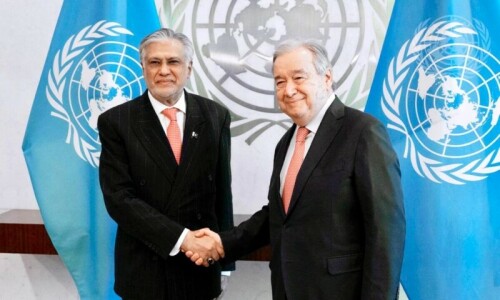ISLAMABAD: The law ministry has been bypassed in the filing of a presidential reference, seeking the interpretation of Article 63-A of the Constitution by the Supreme Court.
Attorney General for Pakistan (AGP) Khalid Jawed Khan is of the view that since the reference pertains to Article 63, which is linked to the Elections Act, the relevant authority is the Ministry of Parliamentary Affairs which has completed all the codal formalities.
But legal experts and former government officials insist that it is the purview of the law ministry.
Sources in the law ministry pointed out that the presidential reference sought “interpretation of Article 63-A in a manner that Khiyanat by way of defections warrant no preemptive action save de-seating the member as per the prescribed procedure with no further restriction or curbs from seeking election afresh”, and Article 63-A, which itself was an explanation of Article 63, was a subject of the law ministry.
The sources said the law ministry was kept in the dark on this particular issue since it had objected to proposal to promulgate an ordinance to disqualify the PTI dissidents planning to vote on the no-confidence against Prime Minister Imran Khan.
The law ministry is of the view that explanation of Article 63 (1) (P) pertaining to disqualification of members of the national and provincial assemblies is obvious as it states: “For the purposes of this paragraph ‘law’ shall not include an ordinance promulgated under Article 89 or Article 128.”
It meant a lawmaker could not be disqualified through the presidential ordinance, the sources said, adding that the law ministry was asked to review the objection and draft a ‘vague’ ordinance to deter the dissidents, but “the ministry did not cooperate”.
Subsequently, the law ministry was kept out of further consultation vis-à-vis filing of the presidential ordinance and its input was not sought even on the issue of National Assembly session requisitioned by the opposition in connection with the no-confidence motion against the prime minister.
According to well-placed sources, the presidential reference was drafted by the attorney general and transmitted to the Parliamentary Affairs Division for completing the formalities and, after slight changes, Adviser to Prime Minister on Parliamentary Affairs Babar Awan submitted it to the Cabinet Division under Sub-Section ‘e’ of Section 16 of the Rules of Business of 1973.
The section defines the cases to be brought before the federal cabinet and its sub-section refers to “a reference to the Supreme Court for advice on a question of law under clause (1) of Article 186”.
As per Section 54 of Schedule V-B of the Rules of Business, it is the responsibility of the relevant division to deal with the “reference to Supreme Court on any question of law”.
Former special assistant to the prime minister on bureaucracy Khawaja Zaheer Ahmed said that Section 14 (b) of the Constitution clearly stated that on the matters relating to interpretation of any law, every division had to consult the Law and Justice Division.
The sources said the Parliamentary Affairs Division, however, forwarded a summary to the law secretary with an instruction for onward submission to the prime minister, hence, in this particular case, the law ministry was merely used as a post office.
Former law minister Farooq H. Naek, when contacted, said that since Article 63-A was not part of the Elections Act, the presidential ordinance should have been prepared by the law ministry. He pointed out that the PPP government had in the past filed two references, including the one seeking revision of the conviction of former prime minister Zulfikar Ali Bhutto, and both were initiated by the law ministry.
Former attorney general Ashtar Ausaf told Dawn that it was the sole responsibility of the law ministry to prepare and file the reference.
“In my considered view, whenever the opinion of the court is sought, on a reference by the president of Pakistan, the following ought to trigger: notices under Order XXVII-A need to be issued to all the advocates general; the elected representatives of the apex bars should also be put to notice; since there is no room for review of an opinion and finality is attached to it, the entire court should assemble and deliberate on the issues; and amicus briefs should also be invited,” he added.
Published in Dawn, March 24th, 2022













































